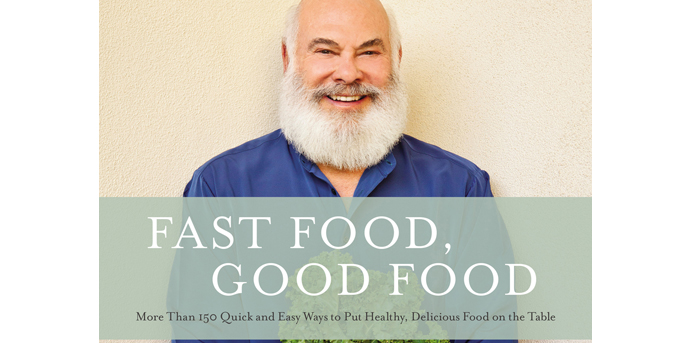Dr. Andrew Weil, M.D., is a leader in the field of integrative medicine, a prevention-oriented, evidence-based approach to health, which takes into account the whole person, including all aspects of lifestyle. Integrative medicine combines the best practices of conventional and alternative medicine and works from the premise that the body can heal itself, if given the chance. Methods such as nutrition, herbal remedies, supplementation, and stress reduction are used as natural and less invasive remedies to promote healing.
Weil is the author of “Fast Food, Good Food,” “True Food,” “Spontaneous Happiness,” “The Healthy Kitchen” (with Rosie Daley), “Healthy Aging” and other books.
Start healing your body today with these anti-inflammatory healthy eating tips!
Fiber
- Aim for 40 grams of fiber per day to include a variety of colorful fruits and vegetables, beans and whole grains.
- Vegetables rich in soluble fiber such as asparagus, berries, and artichokes provide a healthy food source for the gut microbiome.
- Cooking with spices such as black pepper, ginger and cumin can aid digestion of high fiber foods.
Carbohydrates
- The type and quality of carbohydrates impact their association with disease.
- Fruits, vegetables, legumes, and unprocessed whole grains are a rich source of fiber, vitamins, minerals and phytonutrients.
- Whole wheat bread is not a whole grain. Beans, berries, legumes and whole grains are healthy sources of carbohydrates.
- Eat a plethora of cruciferous vegetables, a rich source of sulfur-containing compounds known as glucosinolates, such as broccoli, cabbage, Brussel sprouts, kale and collard greens, daily.
- Consider organic when possible. Check out the Environmental Working Group for the Dirty Dozen and Clean Fifteen.
- Prioritize organic apples, celery, tomatoes, cucumbers, grapes, nectarines, peaches, potatoes, snap peas, spinach, strawberries, sweet bell peppers, hot peppers and kale/collard greens.
- The USDA recommends eating 1/2 cup of green leafy vegetables a day to prevent nutrient deficiencies and serious illnesses. Leafy greens include spinach, collard greens, kale, Swiss chard, turnip greens and mustard greens.
- Vinegar can cut the glycemic response by 1/3. Adding vinaigrette dressing to a salad helps lower the glycemic response to food.
Fats
- Include omega-3 rich foods such as wild salmon, sardines, herring, black cod and albacore tuna.
- Plant sources of omega 3’s include walnuts, flax, chia and hemp seeds.
- Enjoy foods high in monounsaturated fats such as olive oil, avocados, nuts and seeds. Eliminate soy and corn oil, which are high in pro-inflammatory omega-6s.
Protein
- The recommended allowance is around 56 grams for men and 46 grams per day for women of lean protein sources.
- Enjoy plant-based proteins such as tempeh, lentils, legumes, hemp seeds and quinoa.
- Enjoy dairy from organic grass fed cows which have been shown to produce a more anti-inflammatory fatty acid profile than non-organic grain fed cows.
- Eat less protein if you have kidney, liver, allergies, or autoimmune disease.
- Grilling, broiling, roasting, frying and searing at high temperatures animal derived protein that are high in fat accelerate new “AGE” (Advanced Glycation End products) formation and inflammation, which can become pathogenic when found in the tissues.
- Cook with moist heat, lower cooking temperature, and create a citrus or vinegar marinade for food that will be broiled or grilled to reduce AGE’s.
Fructose
- Diets high in added fructose are associated with increased risk of non-alcoholic fatty liver and raise inflammation.
- Aim for less than 25 grams of fructose per day.
- Foods high in fructose include: sugar sweetened beverages, breakfast cereals, breads, fruit flavored yogurts, candy and candy bars, fruit juice blends, salad dressings and condiments, energy bars, and agave syrup.
Asian Mushrooms
- Excellent source of protein, fiber, vitamins A, B3, B12, C and D, and bioactive compounds that have anti-inflammatory, and anti-hypertensive effects.
- Shiitake mushrooms are used medicinally for conditions such as depressed immune function, cancer, diabetes, environmental allergies, high cholesterol and infectious disease.
- Add to a stir-fry, omelet, soup, or create mushroom pâté.
Turmeric
- Contains curcumin, an amazing compound used for prevention and healing.
- Turmeric functions as an anti-inflammatory anti-oxidant shown to be anti-cancer, contains pain relieving properties to support tendinitis and arthritis, has neuroprotective benefits that support brain health, and is shown to be effective in people with gastrointestinal diseases.
- Add turmeric to any savory dish, and it tastes great in a turmeric latte.
More from Make It Better:

